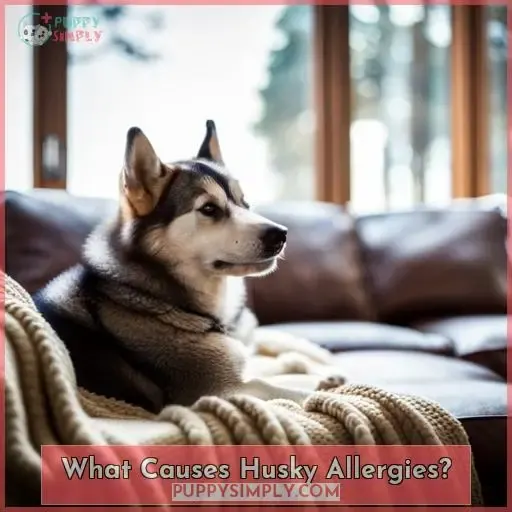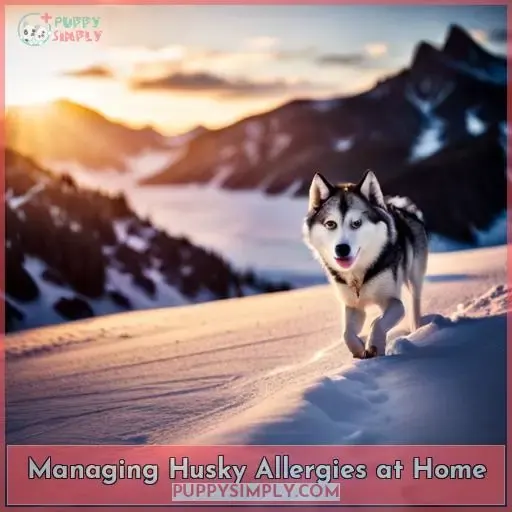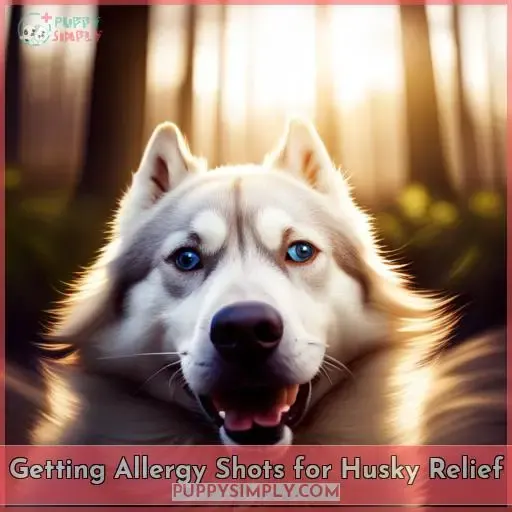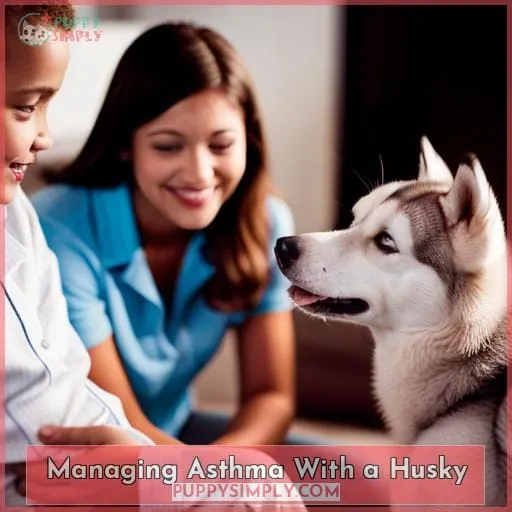This site is supported by our readers. We may earn a commission, at no cost to you, if you purchase through links.

Unfortunately, huskies aren’t hypoallergenic. Their thick double coats produce lots of dander that triggers allergies.
But you’ve got options.
Limit access, use air filters, and clean obsessively to reduce allergens.
Consult an allergist about shots or medication to control symptoms.
And consider less allergenic breeds like poodles or schnauzers so you and your furry friend can live happily together.
Table Of Contents
- Key Takeaways
- What Causes Husky Allergies?
- Are Huskies Hypoallergenic Dogs?
- Managing Husky Allergies at Home
- Finding a Less Allergenic Dog Breed
- Getting Allergy Shots for Husky Relief
- Should I Expose My Child to a Husky?
- Managing Asthma With a Husky
- Frequently Asked Questions (FAQs)
- What type of coat do huskies have that causes allergy issues?
- Can you train a husky not to lick themselves as much to reduce allergens?
- Would taking a daily allergy medication allow me to live comfortably with a husky?
- Is there any kind of air filter or purification system that can remove husky allergens from the air?
- If my child is allergic to huskies, could we foster one temporarily to see if their immunity improves?
- Conclusion
Key Takeaways
- Use HEPA air purifiers, limit the dog’s access, and groom frequently to reduce allergens at home.
- Consider less allergenic breeds like poodles or schnauzers if living with a husky is challenging.
- Immunotherapy/allergy shots can help build a tolerance to husky allergens over time.
- Combine allergy shots with other strategies like air purifiers and grooming for the best allergy relief.
What Causes Husky Allergies?
Huskies trigger allergies through proteins found in their dander and saliva.
Their heavy year-round shedding also spreads these allergens throughout your home.
With their dense double coat continuously producing dander, keeping husky allergens at bay can be an uphill battle.
Dander and Saliva Proteins
Along with shed fur dispersing it throughout your home, a husky produces allergens through skin dander and proteins in its saliva that can trigger reactions in sensitive people.
These allergens from dander and saliva stick to surfaces and fur, spreading with shedding.
Finding solutions to control shedding and dander can help allergy sufferers, though no dogs are fully hypoallergenic.
Exploring more allergy-friendly breeds or managing exposure may assist if husky allergies persist.
Shedding Spreads Allergens
You’re also spreading those allergens around your home when your husky sheds its fur.
Vacuuming techniques to promptly remove shed fur, combined with designating allergen-free spaces and regular grooming practices, can help.
Additionally, using air purifiers and considering more hypoallergenic breeds may provide relief from allergy symptoms caused by husky shedding.
Double Coat Produces Dander
With their thick double coats, huskies produce abundant dander that can trigger allergic reactions when shed and spread around your home.
- Excess skin cells in undercoat
- Trapped saliva and skin oils
- Airborne allergens
- Year-round shedding
- Weekly brushing essential
Are Huskies Hypoallergenic Dogs?
If you’re considering getting a Husky but have allergies, it’s important to know that Huskies aren’t hypoallergenic dogs.
They produce proteins in their saliva, skin, and urine that can trigger allergic reactions.
While no dog is 100% hypoallergenic, some breeds are better for allergy sufferers.
The amount and type of dander and saliva a dog produces matters more than fur type.
Breeds like Poodles and Portuguese Water Dogs shed less and may cause fewer allergy issues.
Allergy-Friendly Breeds
| Breed | Shedding | Saliva |
|---|---|---|
| Standard Poodle | Low | Low |
| Portuguese Water Dog | Low | Low |
| Labradoodle | Medium | Medium |
If you adore Huskies, try managing allergens at home before giving up your dream dog.
But less allergy-triggering breeds do exist if symptoms persist.
Discuss options with your doctor, including allergy shots and asthma management.
Managing Husky Allergies at Home
When living with a husky, you’ll need to take steps to control the spread of allergens:
- Use high-efficiency particulate air (HEPA) purifiers.
- Limit your dog’s access to certain areas.
- Keep fur under control through frequent grooming and vacuuming.
Taking these precautions can help reduce allergy symptoms for family members sensitive to dog dander.
Keep Fur Under Control
Because huskies shed frequently, you’ll want to:
- Brush your dog daily.
- Bathe it weekly to control loose fur and limit the spread of allergens around your home.
Invest in:
- A good vacuum cleaner.
- Air purifiers for your home to help capture allergens.
You may also want to:
- Restrict your dog’s access to certain areas like bedrooms to further reduce exposure to allergens.
Regular grooming and cleaning are key to managing husky allergies.
Use Air Purifiers
You can also mitigate allergens by using air purifiers with HEPA filters in rooms your husky frequents.
Investing in quality air purifiers can significantly improve indoor air quality and trap irritating particles that trigger allergy symptoms.
Consider these 3 tips when selecting an air purifier:
- Choose a model with a high CADR rating for efficient particle removal.
- Select the proper purifier size based on room dimensions.
- Replace filters regularly per manufacturer guidelines.
Limit Dog’s Access
Through air purifiers, you’ll want to limit your husky’s access to certain areas of your home to further cut down on allergens.
Establishing some basic training boundaries creates allergen-free zones that reduce exposures for allergy sufferers.
The most important access restrictions typically involve keeping your pet out of bedrooms to ensure they stay pet-free.
Simply closing doors creates a quick way to limit exposure while allowing your husky to enjoy the rest of your living spaces.
Additional access limits can help restrict the spread of allergens.
Finding a Less Allergenic Dog Breed
Transitioning from allergen management to allergen avoidance, you’d be wise to consider less allergenic dog breeds if living with a husky proves overly challenging for your allergies.
Evaluate hypoallergenic breeds like poodles or schnauzers.
Research alternatives like hairless or nonshedding breeds.
Discuss immunotherapy options with an allergist.
Certain breeds like poodles, schnauzers, or specialized hairless breeds produce less dander and saliva proteins that trigger allergic reactions. Thoroughly researching and evaluating hypoallergenic alternatives before bringing home a new pup can reduce allergy triggers.
For moderate reactions, discussing allergy shot regimens with an immunologist provides long-term allergen reduction without fully giving up on owning your dream husky.
Implementing both alternative breed consideration and immunotherapy keeps multiple options open for minimizing allergy struggles while living with dogs.
Getting Allergy Shots for Husky Relief
Immunotherapy helps lessen your allergic reactions to huskies over time.
Allergy shots containing small amounts of dog allergens are injected under your skin to get your body used to them.
Over several months, the allergen amounts increase as your tolerance builds.
Most people find allergy shot relief after 6-12 months of treatment.
Allergy shots reduce allergy symptoms, need for medication, and sensitivity to allergens when around dogs.
They can provide long-lasting benefits.
Combining allergy shots with other coping strategies like air filters, frequent bathing of your husky, and finding a compatible hypoallergenic breed can help allergy sufferers live comfortably with their furry friends.
Though costly and time-intensive upfront, immunotherapy is an investment that pays dividends for years through reduced allergies.
Should I Expose My Child to a Husky?
Before bringing a husky puppy home, consider if exposing your child is the right move if they already suffer from dog allergies.
Gradually introduce your child to huskies to assess allergy symptoms.
Consult an allergist about potential benefits of early exposure.
Ensure proper parental supervision and allergy medication on hand.
Set limits on puppy interaction if allergies persist.
Focus on managing symptoms and teaching children safety.
Research suggests early exposure may reduce the likelihood of developing dog allergies later on. However, introducing a new husky into the home wouldn’t be advisable if your child already exhibits allergy symptoms.
Carefully monitor your child’s reactions, have medication available if needed, and set appropriate limits on interaction while aiming to create a safe, understanding environment. With proper precautions and guidance, exposure could lead to increased tolerance.
Managing Asthma With a Husky
While dog hair itself doesn’t cause allergies, husky pet dander or saliva can trigger allergy symptoms like sneezing, congestion, and asthma attacks in some people.
If you or your child has asthma, you’ll need to take steps to minimize exposure:
- Keep the husky out of the bedroom and off furniture.
- Vacuum twice a week.
- Bathe your dog weekly to reduce allergens.
- Use air purifiers with HEPA filters to remove dander from the air.
- Antihistamines and allergy shots can reduce sensitivity over time.
Yet despite precautions, asthma symptoms may still occur, so keep emergency inhalers handy.
With diligence, you can create a husky-friendly home for your family.
| Asthma Trigger | Ways to Reduce Exposure |
|---|---|
| Pet Dander | Brush and bathe dog weekly |
| Saliva Proteins | Wipe paws after being outside |
| Shed Fur | Use air purifiers and vacuum often |
| Pollen on Fur | Limit time spent outdoors during pollen season |
| Dust Mites in Bedding | Wash dog bed weekly |
Frequently Asked Questions (FAQs)
What type of coat do huskies have that causes allergy issues?
Huskies have a double coat that sheds year-round and heavily twice per year.
Their constant shedding spreads allergens like dander and saliva throughout your home, triggering allergy symptoms.
Regular grooming and vacuuming can help reduce shedding.
Can you train a husky not to lick themselves as much to reduce allergens?
You can train a husky not to excessively lick themselves.
Redirect their licking onto toys or treats.
This distraction reduces dander production and helps minimize allergy triggers.
Remaining consistent is key for establishing this helpful habit.
Would taking a daily allergy medication allow me to live comfortably with a husky?
You might be able to, but allergy meds don’t eliminate all symptoms for everyone.
You’d still need to take precautions like:
- Bathing the husky frequently
- Using air filters
- Keeping it out of bedrooms
Discuss options with your allergist before committing.
Is there any kind of air filter or purification system that can remove husky allergens from the air?
Yes, a HEPA air purifier can effectively capture husky allergens like dander and fur.
Run it continuously in rooms your dog frequents.
Also, vacuum frequently with a HEPA filter and wash all bedding weekly to further reduce allergens.
If my child is allergic to huskies, could we foster one temporarily to see if their immunity improves?
Your child’s allergies might worsen if you foster a husky, even temporarily.
It is best to avoid exposing a child with husky allergies to one, as it risks reactions without building immunity.
Conclusion
At the end of the day, living with a husky while managing allergies comes down to priorities.
You’ll need to weigh your desire for a fluffy companion against your physical comfort.
Like any relationship, it requires work and compromise to thrive.
[Keypoints]But with some practical steps like:
- Controlling fur and dander
- Finding the right medication
- Even considering less allergenic breeds
You can breathe a little easier on your journey to dog ownership.













